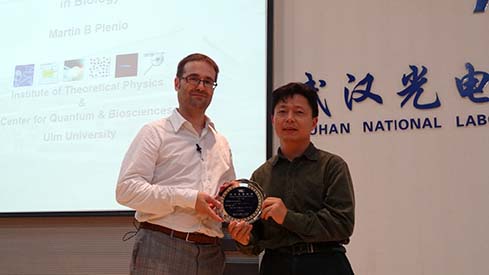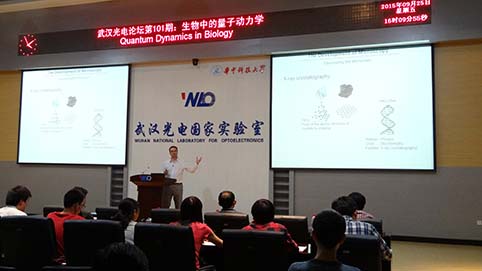WUHAN, China (September 25, 2015) - Wuhan Optoelectronics Forum No. 101 was successfully held in Auditorium A101 at Wuhan National Laboratory for Optoelectronics (WNLO) in the morning of September 25.
In this lecture I will introduce two aspects of the role of quantum physics in biology. On the one hand quantum devices can be used to explore biological systems. Here the use of colour centres in diamond allows for the creation of hyperpolarisation for the use of nano diamonds as contrast agents in magnetic resonance imaging. Furthermore, as a long term perspective colour centres may also allow for the sensing of nuclear spins and the in viva observation of protein structure. On the other hand quantum physics may also play a significant role in biological processes at the molecular scale. In this context it has recently emerged that the interplay between electronic and vibrational dynamics is of fundamental importance in quantum biological processes and may explain the remarkable efficiency of photosynthesis as well as the processes that are underlying our sense of smell.
Prof. Martin B. Plenio is Alexander von Humboldt Professor, and the Direct of the Institute of theoretical Physics Ulm University, Germany. He is the winner of Award of Research Building & Center for Quantum-BioSciences (Founding Director 2014), ERC Synergy Grant (Corresponding PI 2012), The Max Born Medal and Prize (Bilateral Award of the DFG and the IOP, 2012), Alexander von Humboldt Professor (Alexander von Humboldt Foundation, 2008), Royal Society Wolfson Research Merit Award (The Royal Society, 2006), The Maxwell Medal and Prize (The UK Institute of Physics, 2004), Fellow of the UK Institute of Physics (2004).
He is the leading expert in the field of Quantum Information Science, Quantum Optics, Entanglement Theory, Quantum Sensing, and Quantum Effects in Biology. Prof. Martin B. Plenio has published 251 papers in international refereed journals, including 14 articles and letters in Nature & Nature family, 61 Physical Review Letters and 2 Reviews of Modern Physics. Editor of first monograph in the field of Quantum Effects in Biology.

